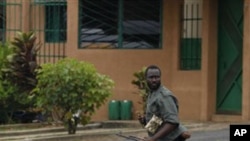The United Nations top diplomat in Ivory Coast says stabilizing the country and starting the process of reconciliation are among the most pressing priorities.
With the arrest on Monday of former Ivorian President Laurent Gbagbo signaling an end to the post-election violence that has rocked the country for the past four months, the head of the U.N.’s peacekeeping mission in Ivory Coast, Choi Young-jin, said the challenge now will be to restore law and order and start the process of national healing.
The envoy briefed the U.N. Security Council via a video link from his headquarters in Abidjan. He said there are four major challenges that need the immediate attention of President Alassane Ouattara’s administration.
"The first challenge is the restoration of peace and law and order throughout the country, particularly in Abidjan. The second challenge is the prevention of any further human rights abuses and violations and the delivery of humanitarian assistance - especially in the western part of the country where several serious problems have already been reported. The third challenge is national reconciliation. On this score, President Ouattara has been making a very clear stance in favor of reconciliation as opposed to retribution. The fourth and perhaps most formidable challenge awaiting the Ivorian people, appears to be national reconstruction - particularly with regard to the promotion of education, creation of youth employment, addressing the land ownership problem, poverty eradication and economic development," he said.
Choi said it is also urgent now that President Ouattara be sworn in to office and finish appointing his government. He noted that so far, only 13 of 30 cabinet positions have been filled.
At the Security Council, the U.N. humanitarian chief, Valerie Amos, who recently returned from a mission to Ivory Coast, warned that grave violations of international law have taken place resulting in the deaths of hundreds and the displacement of nearly a million people.
She said many of Abidjan’s five million residents are in crisis, trapped in their homes without food and water because of continuing fears of violence. She noted that food is scarce in the city’s markets and prices have risen sharply. Outside Abidjan, the recent heavy fighting and the presence of large numbers of displaced persons have also had a serious humanitarian impact.
Amos said the United Nations has appealed for $300 million to cover priority needs, but only 15 percent of that - or $57 million - has been committed.
For its part, the U.N. Security Council encouraged President Ouattara to form an inclusive and broad-based government and urged his government to cooperate with all investigations into human rights violations during the crisis. The council also urged all Ivorians to refrain from further violence and reprisal attacks and instead work together to promote reconciliation through dialogue.
UN: Stabilization and Reconciliation Key in Ivory Coast




